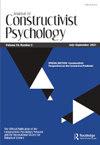A Mixed-Method Comparison of Therapist and Client Language across Four Therapeutic Approaches
IF 1
4区 心理学
Q3 PSYCHOLOGY, CLINICAL
引用次数: 2
Abstract
Abstract This paper illustrates a methodological approach that combines computerized text analysis, quantitative analysis, and qualitative discourse analysis in comparing large bodies of therapeutic language. More specifically, it explores how language use in psychotherapy is associated with different therapeutic approaches and therapeutic roles (i.e., therapists and clients). The dataset consisted of 155 therapeutic sessions (over 1,057,000 words) that are illustrative of four approaches, i.e., psychoanalysis, humanistic therapy, Cognitive Behavioral Therapy (CBT), and eclectic therapy. The transcripts were divided according to therapeutic approaches and therapeutic roles and processed using Linguistic Inquiry Word Count (LIWC) in terms of four summary variables, i.e., analytical thinking, clout, emotional tones, and authenticity. A series of mixed-effects models with session as the random effect was fitted, and the statistical patterns were illustrated using linguistic examples and discussed from a discourse analytic perspective. The approach demonstrates methodological strengths in exploring large-scale data and expanding the research scope permitted by traditional discourse analysis. The findings underline professional knowledge and institutionalized roles as key factors influencing the use of therapeutic language, providing meaningful insights for the clinical understanding and future research into therapeutic language.四种治疗方法中治疗师和来访者语言的混合方法比较
摘要本文阐述了一种结合计算机文本分析、定量分析和定性话语分析的方法,用于比较大型治疗性语言。更具体地说,它探讨了心理治疗中语言的使用如何与不同的治疗方法和治疗角色(即治疗师和客户)相关联。该数据集由155个治疗疗程(超过1,057,000字)组成,说明了四种方法,即精神分析,人文疗法,认知行为疗法(CBT)和折衷疗法。根据治疗方法和治疗角色对转录本进行分类,并使用语言探究字数统计(LIWC)根据分析思维、影响力、情感语调和真实性四个总结变量进行处理。拟合了一系列以会话为随机效应的混合效应模型,并用语言实例说明了统计模式,并从语篇分析的角度进行了讨论。该方法在探索大规模数据和扩大传统话语分析允许的研究范围方面显示出方法论优势。研究结果强调了专业知识和制度化的作用是影响治疗语言使用的关键因素,为临床理解和未来研究治疗语言提供了有意义的见解。
本文章由计算机程序翻译,如有差异,请以英文原文为准。
求助全文
约1分钟内获得全文
求助全文
来源期刊

Journal of Constructivist Psychology
PSYCHOLOGY, CLINICAL-
CiteScore
2.40
自引率
0.00%
发文量
22
期刊介绍:
Psychology and related disciplines throughout the human sciences and humanities have been revolutionized by a postmodern emphasis on the role of language, human systems, and personal knowledge in the construction of social realities. The Journal of Constructivist Psychology is the first publication to provide a professional forum for this emerging focus, embracing such diverse expressions of constructivism as personal construct theory, constructivist marriage and family therapy, structural-developmental and language-based approaches to psychology, and narrative psychology.
 求助内容:
求助内容: 应助结果提醒方式:
应助结果提醒方式:


